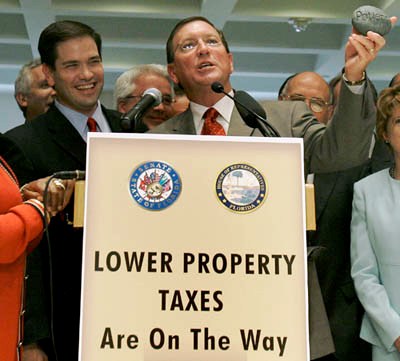|
Despite promised cuts,
Broward governments to collect more in property taxes
|
Article Courtesy of The Sun Sentinel
By Scott
Wyman, Brittany Wallman and John Maines
Published September 9, 2007
This
month was supposed to be historic, a time when local governments would
deliver taxpayers their first relief in years. But a South Florida
Sun-Sentinel analysis found that Broward County property owners likely
will pay an additional $63 million in property taxes this year.
That will bring to $3.5 billion the total property taxes paid for schools,
county, city and other local services -- a 2 percent jump over last year.
That will bring to $3.5
billion the total property taxes paid for schools, county,
city and other local services -- a 2 percent jump over last
year.
Taxpayers started complaining last month when they opened
their tentative tax notices. Some -- particularly business
owners, landlords and snowbirds -- saw another tax increase.
Many others considered their savings paltry.
Why aren't the savings larger? A dozen
of Broward's 31 cities are considering taking advantage of a
little-known opt-out clause in the tax relief plan that the
state Legislature approved in June. School taxes weren't
covered by the law and are going up. And, the taxable value
of property continued to increase dramatically last year.
Michael Ettus of Hollywood was stunned when he learned he
will likely owe $7,000 in property taxes on a condo he
purchased last year for $440,000. He doesn't know how he can
afford it along with the tax bill on his old home. He has
been trying to sell the old place, and unload its $5,600 tax
bill, to no avail. He already works two jobs. |
|
'Drop
like a rock'
Gov.
Charlie Crist promised that property taxes would "drop like a
rock." In this May 4 photo, Senate President Ken Pruitt, R-Port
St. Lucie, holds a rock in reference to Crist's comment during
closing ceremonies of the Legislature on May 4. At left is House
Speaker Marco Rubio, R-Coral Gables.
|
"They
did nothing to help," Ettus said of the Legislature. "They have
destroyed the state and are chasing everyone out. There will be a mass
exodus and people will be giving their property back to the bank as they
leave."
Under the tax relief plan, local governments were supposed to roll back
property tax collections at least to last year's levels. Some were
required to cut an additional 3 to 9 percent. Tax collections in recent
years have ballooned because of higher property values, and governments
that cashed in the most were required to cut the most.
Loophole used
But a loophole in the tax relief law allows local governments to avoid
making large budget cuts with the approval of two thirds of its
commission, though in some cases a unanimous vote is required.
Broward's second largest city, Pembroke Pines, is among the communities
that may opt out of the state-mandated cuts. So may Coconut Creek,
Hillsboro Beach, Lauderdale-by-the-Sea, Lauderdale Lakes, Lazy Lake,
Lighthouse Point, North Lauderdale, Parkland, Pembroke Park, Sea Ranch
Lakes and Southwest Ranches.
Pembroke Pines wants to collect $5.5 million more than the $48.7 million
it took in through property taxes last year, a 11 percent increase.
Lauderdale Lakes wants a 20 percent increase over last year's $7.2 million
property tax collections, while North Lauderdale is seeking a 17 percent
increase over last year's $9.8 million collections.
Pembroke Pines City Manager Charlie Dodge said his proposed increase
likely won't stand at this month's hearings because it would require a
unanimous vote by city commissioners. But the level of cuts sought by the
state won't happen either, he said.
"We've grown our staff and grown services and paid for things with
cash as the tax base increased," Dodge said.
Pembroke Pines' tax base has increased from $5.9 billion to $11.8 billion
since 2001. Dodge said commissioners don't want to reduce "quality of
service" and aren't fond of layoffs.
Larry Tibbs, finance director in Lauderdale Lakes, said his city held five
or six budget workshops and found residents didn't want the steep tax cuts
if it meant "any kind of cuts in police and fire."
"If you're talking about cutting my taxes 30 or 40 dollars, that may
not be worth what we're giving up," said Tibbs, recounting the public
sentiment.
But some residents of those cities are not happy with what their
governments are doing. "If all homeowners are forced to trim their
budgets as smart as possible to get by, I think the city should too,"
North Lauderdale resident David Wright said. He will save $26 off last
year's bill of $1,961.
Tax relief advocates are warning that government officials who don't cut
spending will face consequences. Gov. Charlie Crist has said anyone
raising taxes this year should be voted out of office. County Mayor
Josephus Eggelletion accuses cities not following the state tax relief
plan of violating their public trust.
"It is a mistake for those cities that are not complying,"
Eggelletion said. "I hope the voters hold their elected officials
accountable."
The dozen cities stand to collect an extra $12.5 million, while their
counterparts are cutting $31.8 million. Fort Lauderdale is cutting taxes
even further than the state mandate.
Spending
cut
The cities following the state mandate have been cutting services and
raising other fees to pay for tax relief. Some are freezing staff sizes or
laying off employees. Others are eliminating special events and park
programs or cutting back on landscape maintenance work in parks and
medians.
The biggest cuts are in Lauderhill, Miramar, Davie, Tamarac, Weston and
Plantation. Tax collections in each are dropping at least 6 percent.
Broward
County government will collect 3 percent less in taxes, $862 million
compared with last year's $888 million. County commissioners have delayed
opening a new jail, cut aid to urban redevelopment, ended assistance for
single parents to collect child support and raised bus fares.
The cuts, though, are minuscule compared with the boon that rising real
estate values meant to local government coffers.
The unprecedented surge in the real estate market between 2001 and 2006
brought an extra $1.4 billion in tax revenue to the county and its 31
cities. If they stick with their proposed tax rates, they'll lose about
$45 million in the 2007-08 budget year.
Seth Kuker of Hollywood is among those who think the relief is far from
what taxpayers need. The taxes on his $550,000 house in the Hollywood
Hills neighborhood are slated to drop from $10,300 to $9,500.
"In the scheme of life, this savings is nothing," he said.
"I'm paying $10,000 a year in taxes and my insurance is $5,000 to
$6,000. That's a lot of money. These politicians have a responsibility to
help the citizens. They should find a way to make sure everyone pays no
more than a reasonable amount and that is not happening."
Another factor preventing more tax relief is the school system. The
Broward County School District will collect up to an extra $110 million
beyond the $1.2 billion raised last year in property taxes.
State legislators, who have major control the tax rate for schools,
dictated the increase this spring even as they debated tax relief for
residents. How school taxes are set is different because spending on
education must be largely equal per student across the state.
The average savings countywide would have doubled if schools had been held
to the same standards as other governments.
Scope of relief
Overall, Broward homeowners should fare slightly better than the rest of
the state while snowbird, investors in residential property and landlords
are worse off here.
Legislative analysts estimated the average homeowner statewide would save
$174. The Sun-Sentinel found the average Broward homeowner will save $190.
The savings is higher on single-family homes, an average of $229, and less
on condos, an average of $95.
And while the legislative analysts estimated owners of non-homesteaded
residential property would save an average $199 statewide, the
Sun-Sentinel found such owners in Broward will pay an average of $35 more
this year. The reason for the difference: property values jumped 10
percent in Broward last year and landlords, snowbirds and investors are
taxed at the full value of their property while state law limits how much
the tax value of a resident's primary home can increase each year.
The hit was greater on those who own a single-family home lacking
homestead, an average increase of $47. Those owning a condo will pay an
average of $28 more.
Crist touted the state legislation as ensuring property taxes would
"drop like a rock." His spokeswoman, Erin Isaac, defended that
view, saying a referendum scheduled in January would bring more relief if
voters agree. "This is just the first step," Isaac said.
That referendum would launch a second phase of tax relief by overhauling
property tax breaks for permanent state residents even though a
Sun-Sentinel analysis last month showed most homeowners in Broward would
not save any money. Businesses and others who are not eligible for those
homestead protections also wouldn't benefit.
County Commissioner Stacy Ritter, a former Democratic state
representative, is fearful that the limited savings will fuel public
support for draconian tax-cutting efforts. She foresees the Legislature
either forcing deeper cuts in local spending next year or the public
backing the January referendum, a move that she and other county officials
think would hurt government and many residents.
"Most people thought their taxes were going to drop like a rock and
they aren't," Ritter said. "I understand they are frustrated
because they expected the Legislature to solve their problems, but they
should have known better given this Legislature's track record."
|

